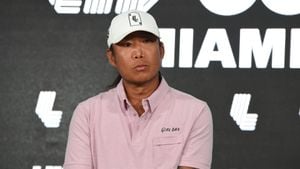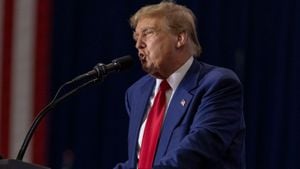Special Counsel Jack Smith announced the dismissal of legal charges against President Donald Trump concerning interference with the 2020 election and the mishandling of sensitive documents. This development marks another significant twist in the saga of legal battles surrounding the former president as he prepares for another term. Under the guidelines of the Department of Justice, prosecuting a sitting president is considered unconstitutional, leading to these recent decision changes.
The request to dismiss the election interference case came formally from the special counsel’s office, emphasizing the long-held position of the Justice Department. According to Smith's statement, "It has long been the position of the Department of Justice (DOJ) prohibiting the federal indictment and subsequent criminal prosecution of a sitting President." Following careful consideration, the DOJ concluded this prosecution must be dropped before Trump is inaugurated.
Smith's motion seeks dismissal without prejudice, meaning the case could be refiled later if circumstances allow. While Trump celebrates this outcome, he and his legal team face continued scrutiny, as multiple lawsuits—from state-level civil suits concerning election outcomes to federal charges—hover ominously.
The core issues raised by Smith originate from investigations launched to examine Trump's activities post-2020 Presidential election. Initially, Trump was charged with multiple felonies encompassing conspiracy to defraud the United States and obstruction of official proceedings. The backup for these charges was assembled following the storming of the U.S. Capitol by Trump's supporters on January 6, 2021, and alleged efforts by Trump to overturn the electoral process.
The dismissal of these charges doesn't signify the end of all legal challenges for Trump. He confronts two state-level criminal indictments and various civil suits, all revolving around his actions during and after his presidency. Notably, there’s the trial involving Trump’s attempts to manipulate the election results in Georgia, where he and his co-defendants face allegations grounded on state racketeering laws.
The conviction concerning the mishandling of classified documents, distinct from the election interference case, was dismissed by U.S. District Judge Aileen Cannon, also citing constitutional groundings. Her decision sparked federal discussions over the validity of the special counsel's appointments, focusing on the issues surrounding constitutional legality and Trump's authority.
Interestingly, after the dismissal of the election interference charges, discussions around future prosecutions arise. The special counsel's notice hinted at possible renewed charges under different circumstances following Trump's presidency. Legal experts express concerns over whether subsequent prosecuting attorneys could push forward additional charges—a fact not lost on Trump's legal team, which continues to monitor any shifts in the political tide.
Trump's response to this latest development was characteristically assertive. On social media, he labeled the indictments as “empty and lawless,” highlighting his belief, shared by many of his supporters, of being politically targeted. His communication director, Steven Cheung, heralded the DOJ’s decision as victory for justice and the rule of law.
Despite these wins for Trump, it is pivotal to acknowledge the continuing pressure of legal difficulties. For example, the civil suits alleging his role during the January 6 incidents and other financial controversies could threaten his resolve as he prepares for the next presidential campaign.
Weighing the entire situation, as Smith filed the motion to dismiss, it wasn't merely the legal principle of immunity from prosecution affecting these decisions but the broader political atmosphere, the substantial public sentiment around accountability, and the cultural significance of the transition of presidential power. Trump’s legal entanglements are likely to remain at the forefront of American political discourse as the nation gears up for the next election.
The contours of legal accountability now entwine seamlessly with the electoral process, as Trump's actions continue to prompt deep reflections on the balance of power and legal principles guiding the presidency. By ditching the charges against him—if only temporarily—Trump reasserts his political narrative of facing and overcoming suspects imposed by the establishment. The looming question concerns how voters will react to these legal developments as he presents his case for reelection.



